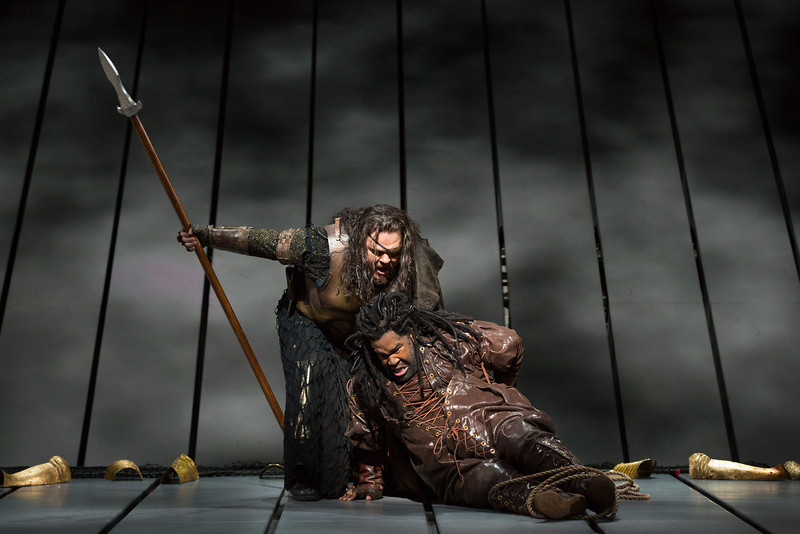An excellent cast triumphs over the machine in Met’s “Rheingold”

Mark Delavan as Wotan and Eric Owens as Alberich in Wagner’s “Das Rheingold” at the Metropolitan Opera. Photo: Marty Sohl
Someone involved with the Robert Lepage staging of Richard Wagner’s Der Ring des Nibelungen at the Metropolitan Opera must have done something nasty in a previous lifetime. The multimillion-dollar machine—which (in theory) raises, lowers, and splays the massive planks of Carl Fillion’s unit set—has broken down repeatedly since the production bowed in the 2010–11 season, and acted up again at Saturday afternoon’s Das Rheingold season premiere.
According to a company statement, there was “a technical problem with the track and trolley system used to guide the acrobat doubles in the transitions to and from the Nibelheim scene.” Wotan and Loge, then, made no dizzying treks to and from the steamy realm of the dwarves but simply pottered about the stage apron. The misbehaving contraption, like a self-serving prima donna, once again made the show all about itself.
A pity, because Saturday’s musical performance was honorable, and Lepage’s staging is, if nothing else, an improvement on the Met’s old Otto Schenk production, which was studiedly naïf. Many critics have noted the tendency of Wagner’s music to mimic sound that emerges from some “unmediated” or “untainted” source—the primal hum that opens Das Rheingold, say, or Siegfried’s forest murmurs—and related it to his distaste for the modern world and those he blamed for its woes. With its creaks and thuds, Lepage’s gimpy machine reminds us that what we are seeing and hearing is an elaborate artifact, thus offering a healthful measure of distance from the more toxic aspects of Wagner’s overpowering art.
In any event, several members of the fine Met cast were seeing to the overpowering themselves. Stephanie Blythe was a regal and sympathetic Fricka, lustrous in tone and trenchant in her delivery of the text, most memorably when rebuking Wotan for bartering away their sister Freia “without shame.” Franz-Josef Selig and Hans-Peter König lavished black, craggy sound and verbal bite on the giants’ music while admirably differentiating the brothers in mien and affect—Fasolt more callow and impulsive, Fafner more wily and decisive.
Eric Owens’ Alberich remains a marvel, both hateful and poignantly human whether clambering after the Rhinemaidens or still and sullen, a singularity of rancor, as he ponders the theft of the Rhine gold. His voice gave way briefly when cursing the ring that Wotan and Loge have wrested from him, but he otherwise sang the dwarf’s intricate, wide-ranging music with unflagging energy and skill.
Even in such remarkable company, Stefan Margita’s Loge was the performance’s driving force. François St-Aubin’s costume for the fire god flashes and twinkles, and Boris Firquet’s video imagery and Etienne Boucher’s lighting sheathe his feet in flames as he slithers up and down the set. It t is the sizzle of intelligence and wit, though, that makes Margita’s clear, perfectly projected voice glow. On Saturday afternoon he sometimes mugged—Wagner’s music needs no whoops and cackles to embellish it—but how giddily he mocked the gods of Valhalla, turned grau, greis und grämlich (“wan, grey, and weary”) when deprived of Freia’s golden apples, and how nimbly he embodied a natural element that is merry and lethal all at once.
Mark Delavan is a capable and intelligent artist, but unlike Bryn Terfel, who created the role of Wotan in this production, he lacks the gift of making you believe you are in the presence of a god with sheer beauty of sound. Aloof and morose, he was coldly brutal in his dealings with Alberich—no “Licht-Alberich,” as the Wanderer names himself in Siegfried, but a power darker and more evil than his dwarfish counterpart.
As the Rhinemaidens, Dísella Làrusdóttir, Jennifer Johnson Cano, and Renee Tatum sang, frolicked, and taunted Alberich with captivating elegance. For reasons unknown, Erda in this staging of Das Rheingold is just a chick in a bad wig; Meredith Arwady sang well but with little in the way of otherworldly oomph. Franz-Josef Selig was an admirably frantic and repellent Mime; Wendy Bryn Harmer a sweet and dewy Freia (this despite being saddled with the world’s most unflattering costume); Dwayne Croft an alert and virile Donner; and Richard Cox an able Froh.
For many years now the Met orchestra under James Levine has played Wagner as well as any band in history. Of late, New York audiences have enjoyed similarly gorgeous—and ponderous, and ruminative—Wagner readings by such maestros as Daniel Barenboim and Daniele Gatti. Saturday’s Das Rheingold under Fabio Luisi, by contrast, was taut and effervescent. The orchestral passages to and from Nibelheim were all needle-sharp terror; Erda’s chromatic swoons chilled the blood; and the gods’ entrance into Valhalla shone with the urbane grace of the music that inspired it: the radiant finale of Rossini’s Guillaume Tell. Rossini’s score celebrates the return of liberté among humans, while Wagner’s tells of falsity and violence infecting the gods. The Met musicians played it spectacularly well and to uproarious cheers; too bad they and Wagner didn’t have a staging worthy of their efforts.
The Metropolitan Opera’s Ring Cycle I continues on April 13, 20, and 23. Ring Cycle II begins on April 25, and Ring Cycle III, the last of the 2012–13 season, on May 4. metoperafamily.org; 212-362-6000.